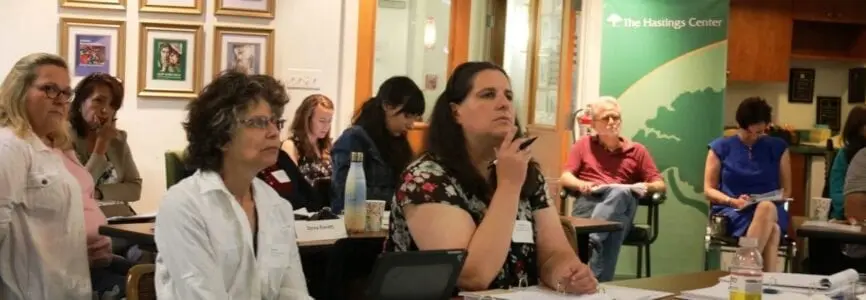Hastings Center News
Bioethics Workshop for Secondary School Teachers Examines the Ethics of Human Gene Editing
Today’s young people will inevitably grapple with decisions about emerging biotechnologies, such as whether new gene editing technologies should be used to choose the traits of their children or enhance their intelligence. The Hastings Center’s inaugural bioethics workshop for high school teachers equipped participants with skills and tools to introduce bioethics into their classes and help their students navigate these difficult dilemmas.
Twenty-one teachers from 12 states, the District of Columbia, and Canada attended the workshop, which was held on July 31 to August 3 at The Hastings Center. It was part of The Hastings Center’s project on gene editing and human flourishing, supported by the John Templeton Foundation.
“The Hastings Center has a major commitment not only to scholarship but to engaging the public,” said Hastings Center president Mildred Z. Solomon, who led the development of the workshop with Carolyn P. Neuhaus, the workshop program director and a research scholar, and Josephine Johnston, director of research. “We are equipping teachers with information and the skills and the practice to bring bioethics to their students.”
The workshop focused on the social and ethical issues raised by CRISPR/Cas9 human gene editing and other breakthrough genetic technologies. Teachers explored the science of gene editing and the social, ethical, and legal implications surrounding its current and future use, including possible use for human enhancement and its implications for the interests of persons with disabilities. Teachers and curriculum developers joined Hastings scholars to lead the sessions.
“This was a real opportunity to think about students and soon-to-be voting citizens,” said Jeanne Chowning, senior director for science education and training at the Fred Hutchinson Cancer Research Center, who participated in workshop planning and led several sessions with Dr. Solomon. “What kind of choices are they going to make, and how will they analyze difficult questions?”
“I think it’s important to teach high schoolers about bioethics because a lot of them, when they come to my biology class, ask, ‘Why does this matter?’” said Kristen Solheim, a science teacher at Franklin D. Roosevelt High School in Brooklyn. “I don’t think they realize that a lot of the things in biology impact them socially . . . IVF, other assisted reproductive technologies, GMOS—all these things that are affecting their generation that they need to think about.”
Watch highlights of the workshop below.

